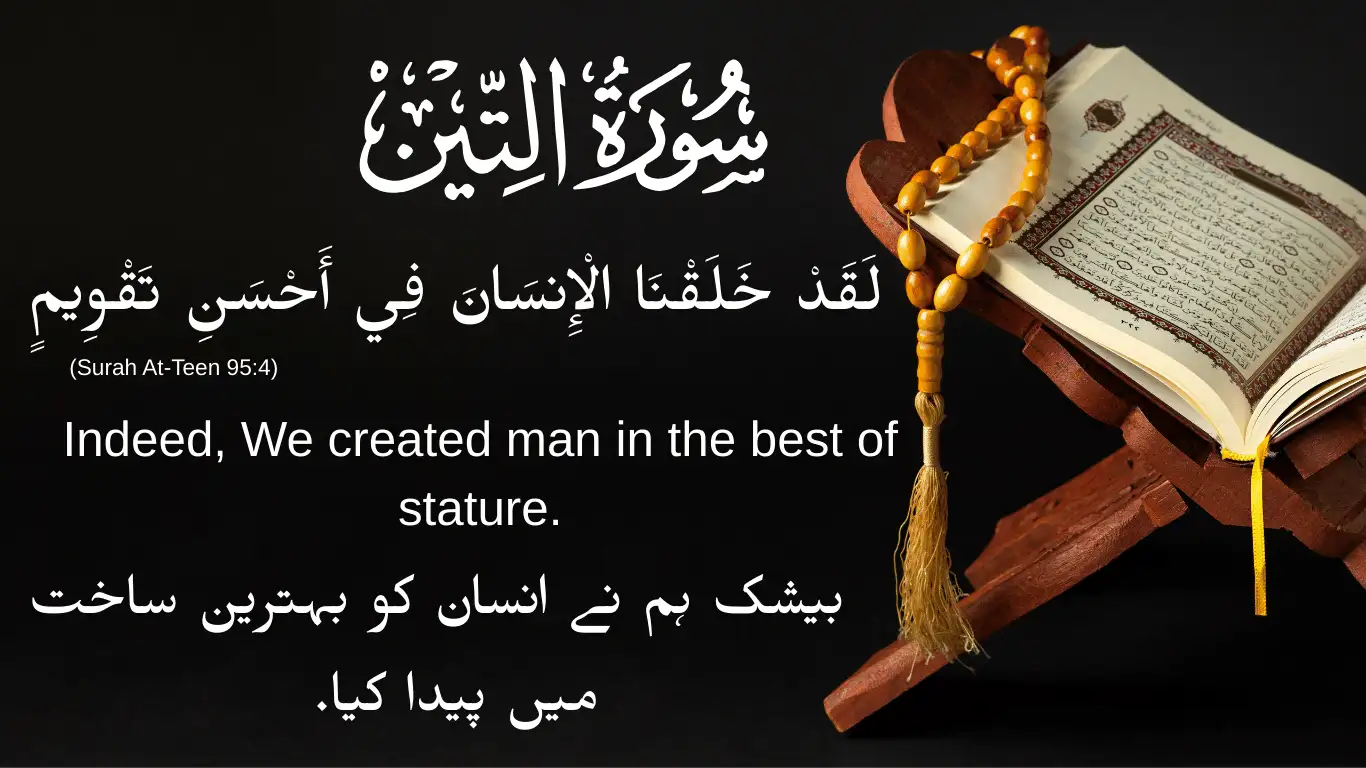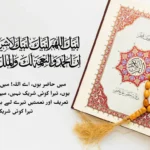Personal Note:
Every time I read Surah At-Teen, especially the verse “Laqad Khalaqnal Insana”, my heart feels a deep sense of gratitude and awe. It reminds me of the priceless value Allah has placed in each of us. This article is not just a reflection but a heartfelt journey through this powerful verse, with authentic references and simple yet meaningful explanations.
Introduction: The Beauty and Depth of Surah At-Teen
Surah At-Teen (سورة التين) is a short yet powerful chapter of the Holy Qur’an. Revealed in Makkah, it speaks about the creation of man, his natural disposition, and his spiritual journey.
One of the most profound parts of this surah is the verse:
لَقَدْ خَلَقْنَا الْإِنسَانَ فِي أَحْسَنِ تَقْوِيمٍ
Laqad khalaqnal insaana fee ahsani taqweem“Indeed, We created man in the best of stature.” (Surah At-Teen 95:4)
This verse alone opens a treasure of wisdom about human dignity, our divine design, and our responsibilities.
Let’s dive deeper into it — word by word, verse by verse — to truly appreciate its significance.
Understanding “Laqad Khalaqnal Insana” – Word by Word
1. لَقَدْ (Laqad) — Indeed, Surely
The word “Laqad” in Arabic is a combination of emphasis tools. It means “without any doubt” or “certainly”. Allah starts with a strong assurance here, indicating the importance of what is about to be said.
Emotional Connection:
Think about it — when someone assures you with certainty, you listen closely. Allah is assuring us personally of our incredible creation.
2. خَلَقْنَا (Khalaqna) — We Created
“Khalaqna” comes from the root “kha-la-qa” (خلق), meaning to create something from nothing, perfectly and precisely.
Reference:
According to Tafsir Ibn Kathir, the term “Khalaqna” shows that creation is an act of divine will and mastery, highlighting Allah’s authority and mercy.
3. الْإِنسَانَ (Al-Insan) — The Human Being
“Al-Insan” refers to mankind in general — every human, without exception. It includes the strong and the weak, the rich and the poor, the righteous and the sinner.
Reflection:
No matter how the world sees us, Allah honored all of us at the moment of creation.
4. فِي أَحْسَنِ تَقْوِيمٍ (Fee Ahsani Taqweem) — In the Best Form and Mould
“Ahsan” means the best, most beautiful, most perfect.
“Taqweem” refers to being shaped, formed, and proportioned in the finest manner.
English Translation:
“Indeed, We created man in the best stature.”
Urdu Translation:
“بیشک ہم نے انسان کو بہترین ساخت میں پیدا کیا۔“
Transliteration:
“Laqad khalaqnal insaana fee ahsani taqweem.”
Tafsir Insight:
Scholars like Imam Al-Qurtubi explain that this means both physical beauty and the potential for spiritual excellence.
| Khairukum Man Ta Allamal Qur an -Sahih al-Bukhari, Hadith 5027 |
| Surah Wateen- Watini Wa Zaitun |
| Darood Sharif Text in Arabic | درود شریف |
| Darood e Taj: Powerful Verses You Need to Know |
How Surah At-Teen Connects to the Human Journey
Surah At-Teen paints a complete picture:
- Natural Purity: Every soul is created upon fitrah — a pure nature (Sahih Muslim 2658).
- Potential for Greatness: Humans have the ability to ascend to great spiritual heights through faith and righteous deeds.
- Warning of Decline: Without faith and gratitude, mankind can fall to the lowest of the low (Surah At-Teen 95:5).
This balance between honor and accountability is what makes our creation so significant.
Lessons from “Laqad Khalaqnal Insana” – For Our Lives Today
1. Self-Respect and Dignity
Realizing that Allah created us in the best form should protect us from low self-esteem. We are valuable not because of wealth or looks, but because our Creator honored us.
“And We have certainly honored the children of Adam…” (Surah Al-Isra 17:70)
2. Purposeful Living
If Allah designed us with such perfection, then surely our life must have a purpose. Our bodies, minds, and souls are entrusted to us to worship Allah, help others, and seek knowledge.
3. Spiritual Responsibility
Physical creation is just the beginning. True honor lies in developing our character, our connection with Allah, and our care for others.
Hadith Reference:
The Prophet Muhammad ﷺ said:
“Allah does not look at your appearance or your wealth, but He looks at your hearts and your deeds.” (Sahih Muslim 2564)
Final Thoughts: Reflecting Personally
Every time I ponder “Laqad Khalaqnal Insana fee ahsani taqweem,” I feel a renewed sense of responsibility and hope. Allah, who fashioned the stars and the mountains, also lovingly shaped you and me.
It’s easy to forget our worth in today’s noisy world, but the Qur’an gently brings us back to this eternal truth.
Let’s strive to live up to the beauty with which we were created — both in body and spirit.




